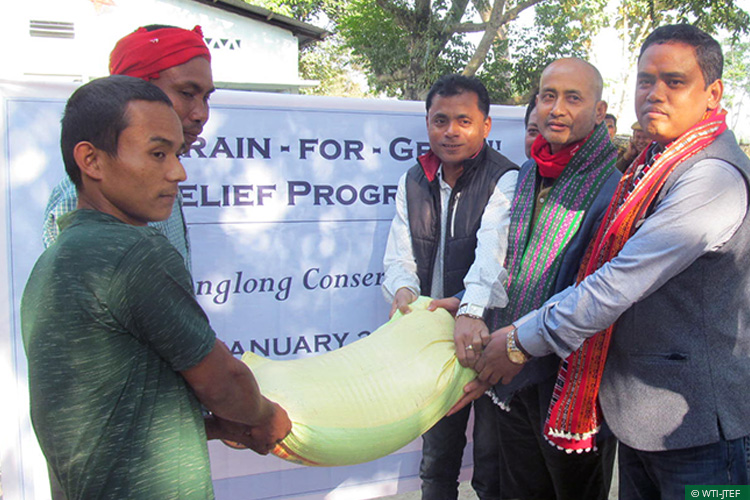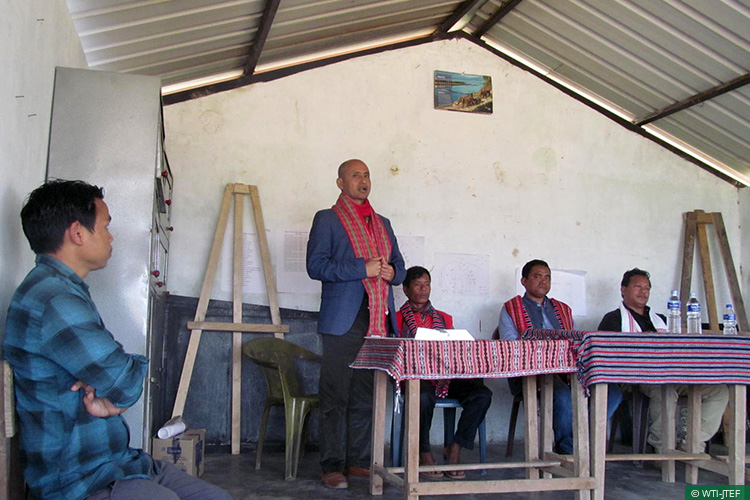
Karbi Anglong, Assam, January 24, 2018: Working in concert with the Karbi Anglong Autonomous Council’s (KAAC) Environment and Forest Department, Wildlife Trust of India (WTI), with support from the Japan Tiger and Elephant Fund (JTEF), yesterday organised a Grain-for-Grain Relief Programme for families affected by conflict with wild elephants.
The relief programme was held at the Chokihola Forest Beat Office under the North Eastern Forest Range in Silonijan. A total of 5725 kilograms of rice were distributed to 114 families in this range, based on records of elephant-related crop depredation and property damage gathered through a survey conducted by WTI and the Forest Department.
The event was graced by Mr Raju Tisso (Executive Member In-charge for Cooperative & Excise, KAAC); Mr Pabitro Rongpi (Member of KAAC and representative of the Nilip Constituency); Mr Winson Ronghang (Chairman for Minority Board, East Karbi Anglong); Mr Sarthe Tisso (Deputy Ranger & Beat Officer), Mr Dilip Deori (Project Lead with WTI’s Kaziranga – Karbi Anglong Link Project) and beneficiaries from different villages under the Forest Beat Office.
Mr. Deori briefed attendees about WTI’s various initiatives – community managed solar power fences, search lights for anti-depredation squads, citrus plantation etc – to mitigate Human Elephant Conflict (HEC), in Karbi Anglong, focusing in particular on the NE Forest Range, Silonijan. Speaking on the occasion, the KAAC’s Mr Raju Tisso said: “The co-existence of wildlife and human beings has been very important in our region; it is a beautiful part of our culture that needs to be reflected in the attitudes and actions of the younger generation. Today, environment and wildlife conservation is a burning issue. It needs to be addressed urgently because human survival is not possible without coexistence with wildlife. We must all join together to respect all living creatures and co-exist peacefully.”
Mr. Pabitro Rongpi of the KAAC stated: “This is a small relief measure being provided to families affected by crop depredation and property damage caused by wild elephants. WTI and the Forest Department are to be appreciated for jointly initiating such a wonderful programme, which not only provides the local beneficiaries a measure of support but also helps in creating a positive mindset among local people towards wildlife conservation.”
Grain-for Grain Relief Programmes will be carried out in three different places under the NE Forest Range:Chokihola, Silonijan and Deopani.

ABOUT GRAIN-FOR GRAIN: For wild herbivores, crops growing on agricultural lands adjoining their forests represent a low-risk, high-gain food sourcing strategy. While long-term solutions include the protection of wildlife corridors and creation of effective barriers between the animals and crops, there is a need for instant relief in cases of crop depredation.
This is particularly relevant in Below Poverty Line communities where traditional methods have involved cash compensations rather than food relief, whereas the latter is of primacy to such communities. One solution is to avoid the word ‘compensation’, instead giving relief in the form of grain equivalent to the amount that has been lost. Pioneered by WTI in Arunachal Pradesh in 2005, Grain-for-Grain is just such an initiative.